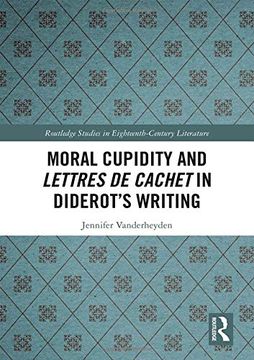Compartir
Moral Cupidity and Lettres de Cachet in Diderot’S Writing (Routledge Studies in Eighteenth-Century Literature) (en Inglés)
Jennifer Vanderheyden (Autor)
·
Routledge
· Tapa Dura
Moral Cupidity and Lettres de Cachet in Diderot’S Writing (Routledge Studies in Eighteenth-Century Literature) (en Inglés) - Jennifer Vanderheyden
$ 578.744
$ 890.375
Ahorras: $ 311.631
Elige la lista en la que quieres agregar tu producto o crea una nueva lista
✓ Producto agregado correctamente a la lista de deseos.
Ir a Mis Listas
Origen: Estados Unidos
(Costos de importación incluídos en el precio)
Se enviará desde nuestra bodega entre el
Miércoles 24 de Julio y el
Lunes 05 de Agosto.
Lo recibirás en cualquier lugar de Colombia entre 1 y 5 días hábiles luego del envío.
Reseña del libro "Moral Cupidity and Lettres de Cachet in Diderot’S Writing (Routledge Studies in Eighteenth-Century Literature) (en Inglés)"
This volume explores the influence of the lettre de cachet on both Diderot’s personal life and his works, beginning with an examination of Diderot’s experience as recipient of two such arrest warrants, followed by an analysis of his references to these warrants in three of his fictional works, Le Père de famille, Jacques le fataliste and Est-il bon? Est-il méchant?. A scrutiny of Diderot’s mémoire/lettre novel La Religieuse proposes that, on the basis of moral cupidity, or self-gain, Madame Simonin sends her daughter Suzanne two veiled lettres de cachet that demand her confinement to a convent. The exploration of a fascinating real-life case of Henriette-Émilie de Bautru, a young comtesse whose mother confined her to a convent as a result of a lettre de cachet also based on motives of greed, leads to an examination of the similarities between Suzanne and the Comtesse in terms of their illegitimacy, questioning of authority and subsequent rebellion. A consideration of writing and communication in La Religieuse as they relate to this rebellion leads to an investigation of Diderot’s admiration of the mystery of female genius and artistic creativity as discussed in his essay Sur les femmes. The works of Julia Kristeva, especially her Post-Scriptum addressed to Diderot at the end of her work Thérèse mon amour: Thérèse d’Avila, serve as a theoretical basis for an interpretation of Suzanne’s experience as victim of a lettre de cachet and her search for a psychological rebirth of her être caché.
- 0% (0)
- 0% (0)
- 0% (0)
- 0% (0)
- 0% (0)
Todos los libros de nuestro catálogo son Originales.
El libro está escrito en Inglés.
La encuadernación de esta edición es Tapa Dura.
✓ Producto agregado correctamente al carro, Ir a Pagar.

